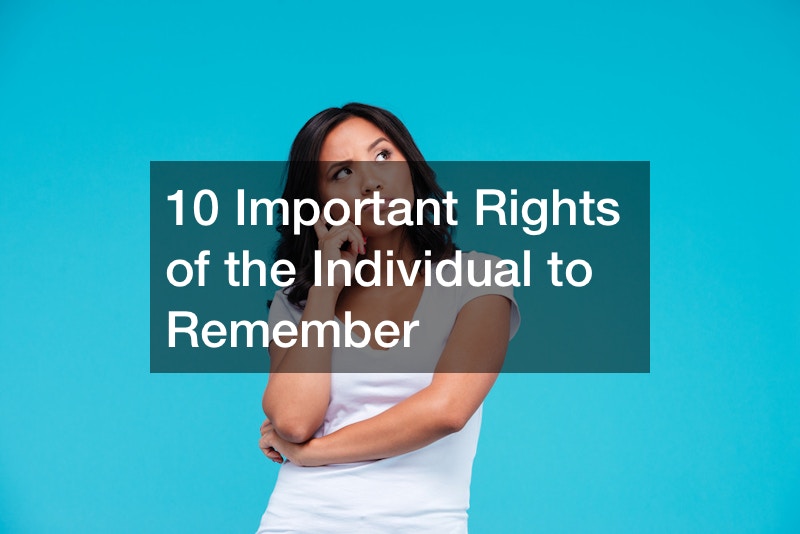Understanding the legal system is essential if you want to make navigating life much easier at any stage, regardless of your age. Knowing the rights of the individual can also help you to determine if you are ever at risk of legal trouble, regardless of the situation you find yourself in or the surrounding circumstances. Familiarizing yourself with the most common rights of the individual will allow you to feel much more confident and comfortable in any decisions you make for yourself in the near future.
1. Privacy

When it comes to the rights of the individual, privacy and the expectation of privacy just might be the biggest one. Privacy is imperative for all humans who live in most democratically run countries or unions today. In the United States, for example, there is a clear expectation of privacy for the individual. Those who live as free citizens in the United States have ‘the right to be left alone’, according to the US Supreme Court.
Privacy is also more important than ever when it comes to the medical and health industries. With the implementation of HIPAA, medical doctors or even an addiction doctor no longer has the right to discuss medical-related issues with others regarding their own patients. Whether you’re struggling with a chronic health condition or you are working to overcome an addiction you have, you should be able to do so with a reasonable expectation of privacy throughout the process without a hassle.
2. Search and Seizure
Understanding the rights of the individual is essential if you have received a search warrant or if you believe you have been unlawfully searched and had your property seized. While official search warrants provide law offices the authority to search an individual or the property they own, they must be issued by a local or regional, or federal judge directly, depending on the type of case you’re involved in. In some instances, however, individuals report being searched and seized outdoors and when spending time in public.
If someone is getting a beer to go or is visiting a state fair after hours, they may be at risk of becoming a target of a law officer, especially if the individual is causing a scene or drawing attention to themselves. However, it’s important to know that a law officer must have a good reason to conduct a search on an individual at any time in the US. While in most instances, a search warrant is necessary, you may also allow an officer to search you if you provide consent or if the officer can visibly see any illegal items or paraphernalia on you. Additionally, officers may also have the right to search citizens if he or she believes you may have contraband in their vehicle or if you were present for another search that took place prior to an arrest that was made on the scene.
3. Tenants’ Rights
Tenants’ rights are also considered the rights of the individual when you are renting a property from a management company or even from a personal landlord. Understanding your rights as a tenant can help you to navigate renting a property whether you are renting to own or if you are resigning somewhere temporarily. Tenants’ rights were developed to protect the rights of the individual over a rental management company that may not respect the individual’s rights to privacy, due process, and other legal amenities they are entitled to personally.
As a tenant of a rental property, you have the right to dispute your leasing agreement at any time, especially if your property is not well-maintained. Tenants have the right to expect proper maintenance and structural integrity of the home or apartment they are leasing while also ensuring that landlords and other service providers are unable to enter the property without written or verbal notice ahead of time. The expectation of privacy also applies to leasing tenants. Livable conditions are also expected and are included in the rights of tenants, regardless of the residence you’re renting and living in at the time.
4. Remaining Silent

When you are committed to learning and understanding more about the rights of the individual, you must understand the individual’s right to remain silent. The right to remain silent is attached to the Fifth Amendment of the US Constitution, which helps to protect individuals from compelled testimony in a court of law. By invoking your right to remain silent, you can stop taking and answering questions from law enforcement until you have retained the legal counsel of your choice. This will help you to protect your privacy and plan of action whenever you are suspected of or charged with a crime.
If you find yourself in a situation in which you are not ready to speak to an authority figure, you may need to invoke your fifth amendment and your right to remain silent. For instance, if a local security guard suspects you of shoplifting and attempts to detain you, it may be best to remain silent until additional officers arrive on the scene or until you can speak directly to an attorney. Knowing when you can invoke your right to remain silent will also help you to feel much more secure in the decision you make in a time of need.
5. Speech
Freedom of speech is one of the most important rights of the individual in the United States today. Currently, the US is the only country around the globe that supports freedom of speech. In other countries and regions around the world, individuals are at risk of being fined or placed in jail for statements or words that are deemed offensive by state-sponsored governments. Understanding your freedom of speech rights is essential if you are an American citizen today.
If you or your child attends public school, they will likely learn about freedom of speech and the First Amendment of the US Constitution. This is the first introduction to understanding your rights as a human being in the United States. Having the ability to speak your mind and say what you feel has had a significant impact on the growth and innovation of the US over many decades.
6. Religion
In the United States, one of the most important rights of the individual is the right to religious freedom. Whether you’re working on a church window restoration service or building your own place of worship, in the United States, you have the right to practice your religion at any time, regardless of your choice of religion. The idea behind the right to religious freedom was to simply prevent government overreach while simultaneously proving privacy and rights to the individual.
It is important to note that while it is permitted to practice any religion you prefer in the United States, it is not the responsibility of the government to pay for or support the religious belief itself. The US government may not support any religious institution or belief system financially. Additionally, while school teachers and professors have the right to teach various religious belief systems, they are not permitted to promote their own beliefs as a part of the educational system’s curriculum that is currently in place.
7. Discrimination

In the United States, citizens are protected by preventing discrimination on the basis of class, creed, religion, nationality, sex, gender, language, sexual orientation, age, or any other health status. Most often, discrimination issues occur when an individual is attempting to obtain a service or apply for employment. Today, employees in the United States are prohibited from discriminating against prospective employees on the basis of their skin color, gender, sexual preference, or even their own religious beliefs.
For instance, if an individual is walking in front of a commercial store and notices storefront signage that implies it is hiring but will not hire individuals of a certain race, this is considered a classic case of discrimination. Storefronts and places of businesses are not permitted to discriminate against an entire class of people, regardless of their reasoning and own preferences. During interviews, if discrimination takes place, the prospective employee may have legal recourse and may have the ability to file a lawsuit, depending on the circumstances of the case individually.
8. Guns
In the United States, citizens have the 2nd amendment, also known as the Right to Bear Arms. Because guns are permitted in the United States, it’s important to understand the ins and outs of your rights as a gun owner. Gun rights may vary from state to state, based on where you live, especially when it comes to making a purchase or even choosing to place your gun for sale on the open or public market. Conducting a bit of research before investing in any type of gun as an official gun owner in the United States is highly recommended to ensure that you are well within your legal rights to do so where you currently live.
As the owner of a gun, an individual can choose to keep, borrow, rent, or even sell their entire weapon to someone else, regardless of the type of gun they are holding. When an individual owns a weapon or has philosophical or legal ownership over an item, they are capable of designating its use as well over time. If you own a gun that is locked away but want to sell it, you may need to seek out a trusted locksmith service that is available locally near you. Turning to a professional service will protect your guns and property while also providing you with a warranty for the work that was completed.
9. Self Defense
If you want to know all the rights of the individual, you must understand your right to self-defense. Self-defense is essential for any person who feels as if their life is being threatened or is in immediate danger. When an individual feels that their life is at risk, they have the right to defend themselves through any means possible. If you find yourself embroiled in a legal battle that required you to invoke your individual self-defense rights, you may need to retain a personal injury attorney. An attorney can help walk you through your rights and the steps necessary to get your life back on track.
10. Due Process

Anytime you are charged with a crime or criminal offense, you are owed due process, at least in the United States. In the US, due process is considered the process which must be followed before an individual’s property, life, or liberty has been taken from them. Following the guidelines of both federal and state courts, due process exists to protect the rights of the individual citizen and those who may otherwise be unable to defend themselves outside a court of law.
Even when it comes to placing a headstone for an individual you know, there is often a process involved to ensure that it goes smoothly and is done legally and within your own rights. The same applies to those who are facing criminal charges in the US. When it comes to due process, there are two forms involved.
Procedural due process includes the specific steps that must be completed before any government agency or authoritative power can eliminate or remove property, freedom, or life from an individual. Regardless of the charges at play, procedural due process is key. Substantive due process is also essential, as it helps include fundamental human and individual rights that are not exclusively listed in the United States Constitution. One of these rights includes the privacy of the individual. Understanding both sides of due process can help you to better navigate a case of due process for yourself or someone you are representing in a court of law.
When you understand the rights of the individual you hold, based on the country you reside in, you can feel less intimated by those who work in law enforcement, especially if you know you are innocent. Knowing your rights and understanding how to work with them is a way to steer clear of trouble and be hit with an unnecessary legal charge. The more you understand the ins and outs of the rights of the individual, the more likely you are to feel positively and optimistic about any choices you make in your life.



